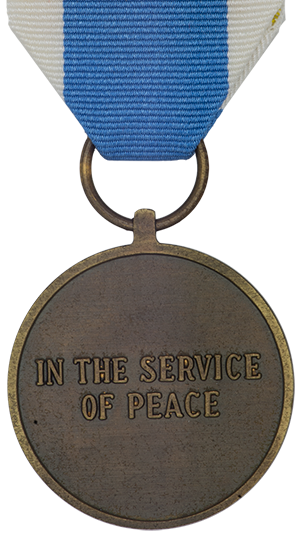UN Special Service Medal (UNSSM)
The official description, eligibility, criteria, and history of the UN Special Service Medal (UNSSM).


Context
This medal was established in June 1995 to recognize those personnel serving the United Nations in capacities other than established peace-keeping missions and United Nations Headquarters.
Eligibility and criteria
This medal is awarded for 90 days consecutive service for the following UN missions:
- Service with the mine clearance and education team in Afghanistan and Pakistan 1989-90. Service requirement is 90 consecutive days. Eligible personnel have already received the Canadian Special Service Medal (SSM) with PAKISTAN 1989-90 Bar for this service. Therefore, recipients must indicate whether they wish to retain this medal or request the UNSSM. If the UNSSM is requested, then the SSM with PAKISTAN 1989-90 Bar (or PAKISTAN Bar if SSM has two or more bars) must be returned to Directorate of Honours and Recognition (DH&R);
- Operation AIRBRIDGE: for 90 consecutive days service with UNHCR at support base, Geneva or Sarajevo airport, or for those personnel who participated in the delivery of supplies and who took part in 100 or more landings at Sarajevo airport during UNPROFOR from 15 February 1992 to 31 March 1995;
- UNSCOM: Eligible personnel will have been seconded to the Special Commission assigned to Iraq for a minimum period of 90 consecutive days or by fulfilling a total of 180 non-consecutive days in Iraq from 01 April 1991 to 17 Decembre 1999;
- Cambodian Mine Action Centre (CMAC) for CAF members who served 90 consecutive days with CMAC from 17 February 1994 to 15 May 2000;
- Operation ACCIUS: 90 consecutive days with the United Nations Assistance Mission in Afghanistan (UNAMA) from 28 November 2002 to 21 June 2005;
- Operation SOLITUDE: 90 consecutive days with the Office of the Special Representative of the Secretary General in West Africa from 22 March 2003 to 14 April 2004;
- Operation SAFARI: 90 days consecutive days with the United Nations Advance Mission to Sudan (UNAMIS) from 01 July 2004 to 23 March 2005; and
- Operation IOLAUS: 90 days consecutive days with the United Nations Assistance Mission in Iraq (UNAMI) from 14 August 2003 to 09 July 2009.
The UN strictly applies their medals policy and will not consider requests for initial issue of the UN medals that are submitted more than one year after repatriation from the mission area.
The qualifying service is not required for members killed or presumed killed while on assignment. In such cases, the medal may be awarded posthumously.
Description
A circular bronze alloy medal, 1.4 inches (35mm) in diameter,
- On the obverse, the representation of the UN symbol surmounted by the straight letters UN, both in bas-relief.
- On the reverse, an inscription bearing the words, "IN THE SERVICE OF PEACE" in English (and only in English).
A 0.5 inch (12mm) bronze ring, which holds the ribbon, passes through a small hollow ball at the top of a claw joined to the top of the medal.
The colour combination consists of a large UN blue stripe framed between two white stripes.
Bar(s)
There is a bar produced for some of the missions recognized by this medal; the bar bears the name of the country or name of the UN organization concerned (e.g. UNAMA). These bars are not created centrally by the UN but rather approved and produced locally by the missions and therefore bars are not created for every mission and those created vary in design and quality.
Wearing
The medal shall be worn in sequence prescribed in the Canadian Orders, Decorations and Medals Directive, and in the following manner: on the left breast, suspended from the ribbon described above, after the MINUSMA medal and before the UNHQ medal.
Post-nominals
The use of a post-nominal is not authorized for this medal.